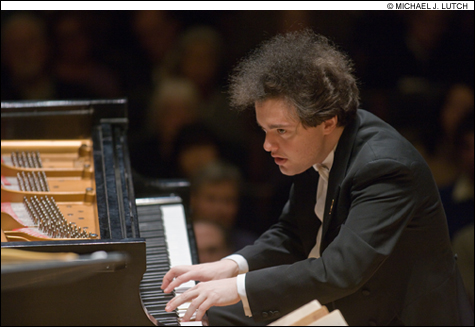
BRAHMS BOY? Evgeny Kissin played with phenomenal dexterity and large-scale grandeur, but the
reflective and searching nature of Brahms’s Second Piano Concerto eluded him. |
The Boston Symphony Orchestra program for last week’s four concerts was a familiar one: a Brahms symphony (the Third) was followed by one or the other of Brahms’s two piano concertos. These works, in similar configurations, have all been heard at Symphony Hall within the last 18 months. Yet the concerts were sold out and greeted with vigorous enthusiasm. Even individual movements got their own smattering of applause. This series was organized to prepare for a new EMI recording, though who is actually going to release it and when is now in some doubt.
No doubt about the source of the excitement: BSO maestro James Levine was leading superstar Russian virtuoso Evgeny Kissin, at 36 still a romantic figure with his stiff Old World demeanor and haunted pallor. And if anyone alive today is equal to Brahms’s technical demands, it’s Kissin.

At the opening concert on April 8, however, the symphony plodded, and though Kissin played the late B-flat concerto, No. 2, with phenomenal dexterity and large-scale grandeur, he seemed to have no clue about the reflective and searching nature of the music. The piece sounded like Rachmaninov. The Andante is one of the glories of Brahms. It opens with a great cello solo, which Jules Eskin played with ravishing and glowing warmth. But in this most emotionally and intellectually but least technically challenging section of the concerto, Kissin merely hit all the notes. Still, he wowed the audience, and after being called back repeatedly, he played Chopin’s charming “Minute” Waltz (though with only the barest hint of charm). Did it matter that Chopin had no connection with the rest of the program? At least on the following night, I was told, one of his two encores was a Brahms waltz (along with a Chopin scherzo).
By the end of the week, despite some ragged edges, the Third Symphony had come to life. Practically spinning on his new swivel chair, Levine seemed more animated, and Brahms’s most dancelike symphony had more lilt and more urgency — subtle little rhythmic swells (especially in the melancholy waltz of the minor-key third movement) that thrust each phrase forward. William R. Hudgins shone in the extensive passages for solo clarinet. And the early D-minor concerto, No. 1, with which Brahms struggled so hard (should it be a piano piece, and if so, for how many pianos? should it be a symphony?), with its even greater bravura and fewer demands for “interpretation,” was more up Kissin’s alley. His playing still had some fussy little self-conscious moments, but the size, agility, and color coordination were breathtaking. His encores were more Chopin — both in C-sharp minor: the ambitious Scherzo (with its solemn chords and feathery descent of heavenly snowflakes played with so much emphasis on texture and color, it sounded more like Liszt) and the famous little Waltz (which had so little ¾-time “lift,” it sounded more like a nocturne).
One of my favorite moments in Emmanuel Music’s Bach B-minor Mass, the culmination of its Bach year, was non-musical. Two long-time Emmanuelites and old friends, soprano Jayne West and tenor Frank Kelley, came front and center for their joyful duet, “Domine Deus,” and smiled beatifically at each other, happy to be singing together and singing this. One of the great legacies left by the late Craig Smith from his 30 years as Emmanuel’s music director is this loving community of lovable musicians.
The B-minor Mass was one of the few pieces that ever gave Smith trouble. But with most of the same singers and players under the sure and knowing hand of his friend composer (and now acting artistic director of Emmanuel Music) John Harbison, the current performance got everything right. One of Bach’s last testaments (it was written piecemeal over a period of some 35 years, and he never heard it complete), it embraces profound solemnity and profound joy, which is exactly what Harbison captured.
Particularly lively, exhilarating tempos gave the Mass its joy, with Paul Perfetti’s trumpet the perfect voice of celebration. Broader tempos gave the Sanctus enormous amplitude. Nothing small-scale or niggling about this performance. And the solemnity was equally heartfelt, from the awesome mystery of the incarnation (one of Bach’s very last pieces, with its repeated descending phrases that, Harbison writes, introduced a new way of writing melody — not by actual notes but by shape) to the agony of the crucifixion to the fervent prayers for mercy. It ended with mezzo-soprano Pamela Dellal’s “Agnus Dei,” the final repeat delivered in a breathtaking almost-whisper.
The vocal soloists, who made up a large part of the chorus, were all eloquent: sopranos West, Gail Abbey, Susan Trout, Susan Consoli, Kendra Colton (especially luminous in her “Laudamus te”); mezzos Dellal and Miranda Loud; tenors Kelley and Jason McStoots (in the lovely “Benedictus”); and baritones David Kravitz (delivering a powerful “Quoniam”) and Donald Wilkinson (turning the dry words about “one holy catholic and apostolic church,” as Bach must have wanted him to, into dancing rhymes). Emmanuel’s chorus has a different, leaner sound from the one it had years ago when it included such eminent members as Lorraine Hunt Lieberson and Susan Larson. This one sang Bach’s five-part voicings with phenomenal focus and clarity.